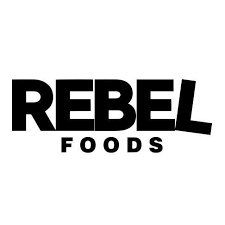Rebel Foods

Biryani from Behrouz to pizza from Oven Story, burger from Wendy’s to snacks from Faasos; all of these weekend food plans to one’s surprise are made possible under one roof. All of this has been made possible by a brilliant idea brewed by Jaydeep Barman and Kallol Bannerjee under the name of REBEL FOODS.
Early StoryJaydeep Barman was born and raised in the city of Kolkata and was a graduate of IIM Lucknow. He further completed his education at INSEAD business school that made him entrepreneurship ready. After returning to India, he settled in Pune. His dire love for Kolkata rolls soon engulfed him completely, leading to the birth of a Quick Service Restaurant format-based rolls company inspired by the success of food MNCs in cities. In 2011, Jaydeep Barman and Kallol Bannerjee launched Faasos, an Indian wrap chain in the city of Pune. As Kallol once stated, they expected Faasos to lead their way into becoming a food MNC like McDonald’s or KFC. They knew that solely selling rolls would not leave a footprint in the tough-to-survive market of India.
Hence, they expanded their portfolio to pizzas; although little did that move help. Customers knew Faasos as a rolls brand. To imprint the idea of good pizzas in the minds of users, Jaydeep and Kallol considered rebranding Faasos to something new. However, rebranding comes with a lot of risks, potentially even losing the current market share. This led to the ideation of a separate brand for pizzas, namely Oven Story. During the early stages, challenges arose with lack of good locations and growing industry competition. They soon tried methods to cut costs to survive and sustain Faasos and Oven Story.
Faasos later commissioned a study which revealed that over 73% of their consumers had never been to a Faasos outlet. Jaydeep and Kallol identified a gaping hole in the Indian food delivery system. They realized that the extremely high operational cost of physical restaurants, along with the constraint of space for kitchens in traditional setups, choked the growth of the food industry in India. For a brand whose 75% audience came from online delivery services only, the need for offline stores did not make much sense. This was where the idea of a cloud kitchen came into their minds—one kitchen that serves multiple brands to a wider audience range.
The Cloud Kitchen RevolutionSoon, they launched more brands to expand their portfolio, namely Behrouz Biryani, Mandarin Oak (Chinese), Slay Coffee, etc. Basically, for every cuisine possible, Rebel Foods had a brand to cover users’ cravings. To manage the mammoth task of handling every single brand in a single cloud kitchen, they developed the Rebel Operating System, which boosted their capital immensely. Unlike any normal restaurant, Rebel Foods was handling 11 food brands under one kitchen. This made cost-cutting easy as they did not need to set up a kitchen at an expensive location along with separate kitchens for various brands.
On account of this tremendous boost in capital, Rebel Foods acquired Wendy’s offline business in India and a majority stake in the popular luxury chocolate brand, Smoor. Rebel Foods was gaining recognition as a trustable brand and became the parent conglomerate for these companies. By 2016, Rebel Foods transitioned to an only-cloud-kitchen business model, and by 2018, they launched the Rebel-Launcher program that allowed them to outsource their cloud kitchens to various other restaurant chains. This expansion strategy helped Rebel Foods dominate the food delivery market across countries like the United Kingdom, Indonesia, United Arab Emirates, Hong Kong, Philippines, Singapore, Malaysia, and Thailand.
When the COVID era dawned upon India, various online food court services like Swiggy and Zomato began flourishing with aggressive advertising strategies. Considering this as a threat, Rebel Foods launched its online food delivery service, EatSure, in 2020. EatSure revolved its ad campaign around “food safety and hygiene,” which instantly developed a loyal user base circling around the brand. They claimed that their food underwent over 200+ quality checks coupled with triple-checked packing, leading to Rebel Foods’ valuation soaring to $820 million USD by FY2020.
Innovation and TechnologyOne of the most important aspects of Rebel Food’s success is their investment in the growth of the company. Rebel Foods is one of the first cloud kitchens globally to use automation machine techniques in their kitchens, which has greatly reduced their operational costs and increased profits. They also invest in R&D, collaborating with their chefs to create machines that assist in mass cooking for 20 brands. For example, woks used by Rebel Foods automatically maintain temperature for perfect crispness and taste, while smart fryers use AI tools to check the size, weight, appearance, and temperature of their dishes (SWAT). This pioneering innovation is key to Rebel Food’s success.
Currently, Rebel Foods operates over 450 cloud kitchens in 75 cities globally. As Jaydeep Barman stated, Rebel Foods is "half passion, half science." This is what Rebel Foods has pulled off greatly by innovating, ideating, and never stopping. They are poised to be one of the largest food brands globally only by “Doing things that many don’t; as that’s what rebels are made of.”